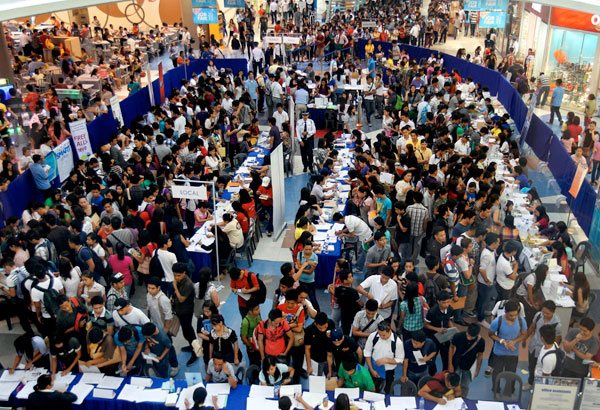The House of Representatives has been actively working even during the congressional recess as it was able to generate quick response from lawmakers regarding preparations for the resumption of sessions on Monday and outlining the chamber’s agenda that includes two priority resolutions which aim to help victims of super typhoon Yolanda and other calamities.
Speaker Feliciano Belmonte, Jr. said over the past few days, the House leadership conducted a series of meetings with various congressmen and various bodies in preparation for the opening of sessions, which will be on Monday.
"The House Leadership, taking the cue from these various consultations, decided on HR 446 and HJR 7 that have already been filed," said the Speaker during the Ugnayan press conference.
The House leadership headed by the Speaker filed House Resolution 446 "Providing Financial Assistance To The Victims Of Typhoon Yolanda" and House Joint Resolution 7 "Waiving All Rights To The Unreleased Balance Of The 2013 Priority Development Assistance Fund (PDAF) And Authorizing The Executive Department To Realign The Same To The Calamity Fund."
By House leadership, Belmonte said he means the Speaker, Majority Floor Leader, Deputy Speakers and the heads of all the party groups comprising the majority in the House. He said there was also consultation with the House minority, who were also invited to the meetings.
Both HR 446 and HJR 7 are co-authored by Deputy Speakers Henedina Abad, Giorgidi Aggabao, Sergio Apostol, Pangalian Balindong, Carlos Padilla and Roberto Puno, Majority Leader Neptali Gonzales, Minority Leader Ronaldo Zamora, Mel Senen Sarmiento (1st District, Western Samar), Enrique Cojuangco (1st District, Tarlac), Mark Llandro Mendoza (4th District, Batangas), Eleandro Madrona (Lone District, Romblon), Elpidio Barzaga, Jr. (4th District, Cavite), Antonio Lagdameo, Jr. (2nd District, Davao del Norte), Rolando Andaya, Jr. (1st District, Camarines Sur), Mar-Len Abigail Binay (2nd District, Makati City), Nicanor Briones (Party-list, AGAP) and Raymond Democrito Mendoza (Party-list, TUCP).
The Speaker said the House has a third proposal, which cannot be put into writing yet as the 2014 national budget is still pending. This involves the realignment of certain items to create a rehabilitation fund.
“The budget has just passed first reading and is still pending second reading in the Senate, but eventually it will go to the bicam committee meeting and during the bicameral meeting we would like to take steps to realign certain items there which we are trying to study now through the Appropriations Committee to create a rehabilitation fund. Maybe we can grant that the President has the power to realign as we maintain he has, but nonetheless Congress should take steps in view of these tragedies and calamities that have been happening in the country. So, we decided to take the initiative to create that rehabilitation fund and we will see to it that the 2014 budget will not leave the bicam committee without the plan there. The rehabilitation program has minimum of P10 billion but our own version would like it to hit at least P20 billion,” the Speaker said.
Belmonte said a meeting on Monday preceded the meeting of the House leadership regarding HR 446 and HJR 7 on Tuesday with members of the Oversight on Disaster Risk Reduction headed by Rep. Rodolfo Biazon for the House panel.
Prior to this, the Speaker said the House also conducted a meeting with a group of economists headed by former National Economic development Authority (NEDA) Director-General Cielito Habito, in which possible legislations that would support the concept of a more competitive Philippines, were discussed.
He said the House also had a meeting with a group of people associated with the Department of Budget and Management (DBM) during the term of President Fidel Ramos, including Secretary Salvador "Jun" Enriquez, who served as the DBM Secretary for the entire six years of the Ramos Administration.
Aside from the meetings, the House also initiated calls to various sectors to help in raising calamity fund for the victims of super typhoon Yolanda.
"I am calling on residents of Metro Manila, starting with Metro Manila local government units most of whom, if not all, are well funded to contribute to the calamity fund, and we are also calling on business establishments to contribute," said Belmonte.
He said the House is offering Congress as one place where people can drop off their donations. "We will make sure that whatever is dropped off here by way of dry goods, by way of used clothing or anything else...we will see to it that these will be sent to the appropriate places," he said.
Meanwhile, as part of the discussions in the oversight committee on risk reduction, Sarmiento said House members have asked how they can help the calamity-stricken areas in the country. He said an orchestrated response during this emergency phase is what is being planned with the involvement of the different House members.
Meanwhile, the Speaker said House members have also been organizing local officials in the provinces and initiated gathering of relief goods for Yolanda's victims.
"The Governor and Congressmen of La Union called me up to say that they are organizing their whole province to get goods. So I am talking about Governor Manuel Ortega, Congressman Victor Ortega and Congressman Franny Eriguel and Abono Rep. Francisco Emmanuel 'Pacoy' Ortega III. All of them have organized the mayors of their province and they have gathered relief goods. I think that is terrific, and I wish other people who are very fortunate will do the same thing," said the Speaker. -
Rowena B. Bundang, Media Relations Service-PRIB

